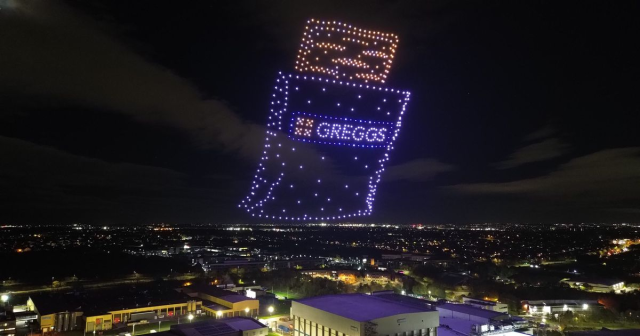If we're not already there, maybe a drone ad revolution will signal the arrival of dystopia.
A Redditor from the United Kingdom shared a photo of what the early days look like, sarcastically calling a flying advert for bakery chain Greggs "the classiest drone display."

The drone arrangement covered a huge swath of sky, and commenters were none too pleased with the intrusion.
"Even the night sky isn't safe from s***** advertising anymore," one wrote. "I'm off to be grumpy."
Another said: "Our ancestors would marvel at what we can do with tech today. What do we do with it? Make flying Pasties."
Light pollution is just one human-caused problem contributing to the climate crisis. And while drone light shows make up only a small part of the issue — and are just another nuisance on a list started by banner ads flown by planes and that now includes floating billboards and bathroom bulletins — they add to skyglow, which illuminates at night areas where 80% of the world and 99% of Europeans and Americans live, according to National Geographic.
This presents human health hazards, affects wildlife behavior, and prevents us from viewing celestial objects. While it may sound like overstating concerns in reaction to one drone display, the accumulation of light pollution does add up, and it uses energy unnecessarily.
Our bodies, attuned to the natural arrival and departure of sunlight, suffer sleep deprivation, fatigue, headaches, stress, anxiety, and more when they are bombarded with nighttime light. Even cancer has been linked to lower levels of melatonin, a hormone produced in the absence of light, Nat Geo noted.
Nighttime light also disturbs animals' sleep and hinders their ability to migrate and form habitats.
Without dark skies, the wonders of the universe become invisible, keeping people from experiencing the natural world, which fosters preservation and portends a cleaner, safer future.
DarkSky International, as Nat Geo pointed out, is dedicated to conserving the night sky and nocturnal environment, calling them "naturally, culturally, and historically important resources." The organization recognizes only 22 dark sky reserves in the world, including seven in the UK and two in the United States.
If you've already switched to energy-efficient LED bulbs, you can help save the night sky by choosing warm options, installing timers, and eliminating light trespass. Avoiding blue lights will also boost your health and animals' well-being.
"Hmm, my adblock's not working," one Redditor joked.
Someone else took an optimistic view, writing, "It's messing about like this that leads to better tech, I'm all for it," though another landed on the opposite end of the spectrum: "Oh dear. There's no hope."
Join our free newsletter for easy tips to save more, waste less, and help yourself while helping the planet.









